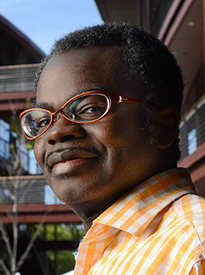
- This event has passed.
ECE DLS- Kwabena Boahen: “Dendrocentric Learning: The Future of Artificial Intelligence
October 20, 2022 @ 4:00 pm - 5:00 pm
 Professor Kwabena Boahen, Stanford University
Professor Kwabena Boahen, Stanford University
Title: Dendrocentric Learning: The Future of Artificial Intelligence
Abstract: Artificial Intelligence (AI) now advances by performing twice as many floating-point multiplications every two months, but the semiconductor industry tiles twice as many multipliers on a chip every two years. Moreover, returns from tiling these multipliers ever more densely now diminish because signals must travel relatively further and further. While travel can be shortened by stacking tiled multipliers in a three-dimensional (3-D) chip, such a solution acutely reduces the available surface area for dissipating heat. Here I propose to transcend this 3-D thermal constraint by moving away from learning with synapses to learning with dendrites. Synaptic inputs are not weighted precisely but rather ordered meticulously along a short stretch of dendrite, termed dendrocentric learning. With the help of a computational model of a dendrite and a conceptual model of a ferroelectric device that emulates it, I illustrate how dendrocentric learning AI—or Synthetic Intelligence (SI) for short—could run not with megawatts in the cloud but rather with watts on a smartphone.
Bio: Kwabena Boahen is Professor of Bioengineering and Electrical Engineering at Stanford University, with a courtesy appointment in Computer Science. He is also an investigator in Stanford’s Bio-X Institute, Wu Tsai Neurosciences Institute, and Human-Centered Artificial Intelligence Institute. He founded Stanford’s Brains in Silicon lab in 2005 to develop silicon chips that emulate the brain and computational models that link neuronal biophysics to cognitive behavior. His scholarship is widely recognized, with over a hundred publications, including a cover story in Scientific American featuring his lab’s work on a silicon retina and a silicon tectum that “wire together” automatically (May 2005). He has been invited to give over a hundred seminar, plenary, and keynote talks, including a 2007 TED talk, “A computer that works like the brain”, with over seven hundred thousand views. He has received several distinguished honors, including a Packard Fellowship for Science and Engineering (1999) and a National Institutes of Health Director’s Pioneer Award (2006). In recognition of his lab’s work on Neurogrid, an iPad-size platform that emulates networks of up to a million cortical neurons in biophysical detail, he was elected a fellow of the American Institute for Medical and Biological Engineering (2016) and of the Institute of Electrical and Electronic Engineers (2016). He is cofounder of Femtosense Inc (2018), a spin-out commercializing technology that makes neuromorphic chips easier to apply, developed by a multi-university, multi-investigator, hardware–software co-design project (Brainstorm) he led.